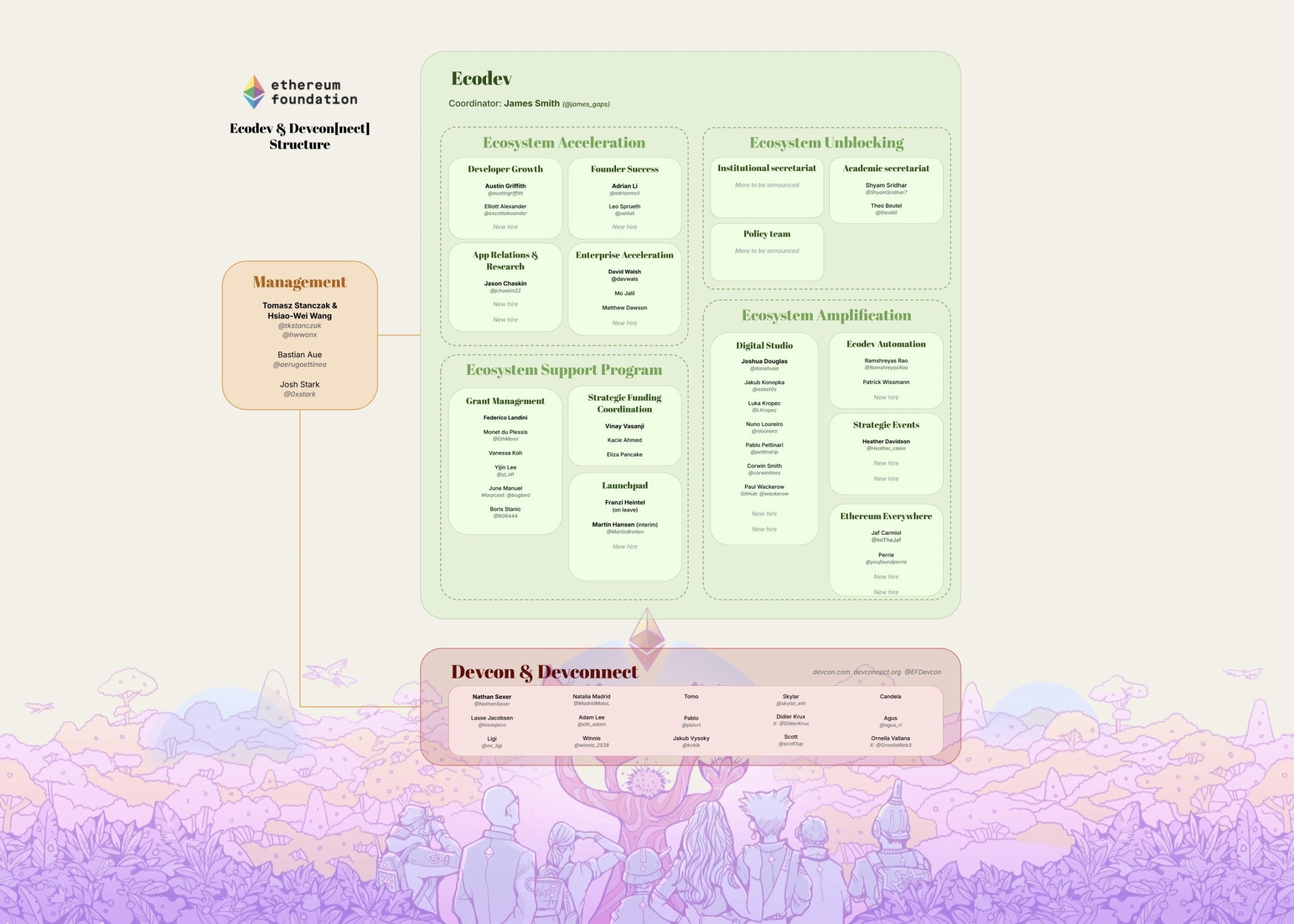Written by: Pzai, Foresight News
On July 10, the Ethereum Foundation released "The Future of Ecosystem Development," initiating a series of profound structural reforms aimed at addressing long-standing challenges in project support, ecosystem operations, and fund management.
In the new vision statement, the Ethereum Foundation outlined two primary overarching goals: first, to maximize the number of people who directly or indirectly use Ethereum and benefit from its underlying values; second, to maximize the resilience of Ethereum's technology and social infrastructure. The core of this structural reform lies in redefining the Foundation's role within the Ethereum ecosystem by introducing four strategic pillars (Accelerate, Amplify, Support, and Long-term Unblocking), establishing a new governance framework, and reforming its fund management strategy to enhance the ecosystem's scalability, resilience, and decentralization.

New Ecodev Organizational Structure
Ecosystem Acceleration
Previously, some users and developers criticized the Ethereum Foundation for its long-standing governance philosophy of "benign neglect," which led to a series of ecosystem fragmentation and a loss of narrative unity. As more enterprises compete to establish crypto reserves, the strategic conquest of reserve strategies has also become a key factor in ecosystem development. In terms of ecosystem acceleration, the Ethereum Foundation has newly established support modules for specific directions, including:
- Enterprise Relations: Providing support for enterprises looking to adopt Ethereum, with a focus on verticals such as finance and supply chain, promoting on-chain tokenization of real-world assets (RWA) like real estate and bonds.
- Developer Growth: Attracting and supporting the next generation of Ethereum ecosystem developers. This module is led by Gitcoin Research Director Austin Griffith.
- Application Support: Accelerating the development of meaningful user-facing applications.
- Founder Support: Non-financial project-related support, led by former Consensys Frontend Tech Director Adrian Li.
The amplification of previous ecosystem acceleration includes work in promotion and ecosystem development, such as:
- Digital Studio (ethereum.org team): The Ethereum narrative engine, producing narrative-rich content, videos, publications, and unique visualizations to showcase Ethereum's potential.
- Strategic Activities: Designing and executing targeted activities.
- Ubiquitous Ethereum: A team focused on expanding support for local communities and centers that assist application developers.
- EcoDev Automation: Enhancing internal operations through automation and AI-driven tools, enabling the team to achieve goals more effectively.
Ecosystem Support
For a long time, the Ethereum Foundation has faced criticism for a lack of transparency, particularly regarding the Ecosystem Support Program (ESP), where the Foundation previously only disclosed the names of funded projects without revealing specific funding amounts or subsequent updates on project progress. Additionally, former early Ethereum developer @econoar criticized the Foundation upon leaving for its "cumbersome processes," "time-consuming efforts," and "disconnection between leadership and the broader community." Following this, the Foundation also reduced its future operating expenses from 15% to 5% by 2025, gradually aligning with the standards of a donation-based organization and deploying on-chain assets to ensure long-term financial buffers (aiming to maintain a 2.5-year operating cash reserve).
In the new structural reform, the Foundation's new ESP/funding support program emphasizes more targeted applications and non-financial support, co-funding important public goods organizations through strategic funding programs to benefit the broader Ethereum ecosystem. Additionally, in the new support structure, Launchpad will assist organizations in addressing operational design, sustainable funding, governance, and other challenges. Support for Launchpad can come from the Foundation, grantees, or other ecosystem organizations' derivatives (similar to Protocol Guild).
In the future, the Ethereum Foundation will also participate in global crypto policy coordination, monitor global issues related to the Ethereum ecosystem, and collaborate with policy organizations worldwide to establish ongoing relationships with governments and non-governmental organizations. Furthermore, as one of the practical venues for blockchain academia, the academic secretariat will actively promote collaboration between Ethereum and universities, professors, and students to advance blockchain technology.
Conclusion
On July 11, Ethereum officially broke through the $3000 mark. As the price of the coin rises, ecosystem development is also gradually advancing. From this structural transformation, the core goal of the Ethereum Foundation's transition is to expand the user base and enhance infrastructure resilience. This means the Foundation will more actively coordinate resources, guide narratives, bridge community divides, and promote the scaling of Ethereum in key application areas while maintaining its core values. As the advantages of public chains are gradually being caught up, the Foundation aims to explore and shape the next growth engine for the Ethereum ecosystem through systematic support and strategic guidance.
免责声明:本文章仅代表作者个人观点,不代表本平台的立场和观点。本文章仅供信息分享,不构成对任何人的任何投资建议。用户与作者之间的任何争议,与本平台无关。如网页中刊载的文章或图片涉及侵权,请提供相关的权利证明和身份证明发送邮件到support@aicoin.com,本平台相关工作人员将会进行核查。




